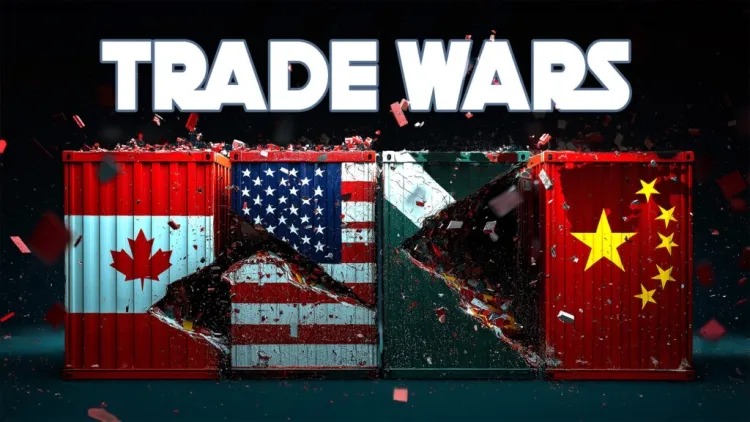Trump's Trade War: Impact on Canada, Mexico, and China...!!!
In recent years, former U.S. President Donald Trump has taken significant actions that have impacted trade relations with Canada, Mexico, and China. These actions, primarily in the form of tariffs, have led to a series of economic and political repercussions.

Tariffs and Trade Policies
During his presidency, Trump imposed tariffs on imports from Canada, Mexico, and China, citing various reasons such as protecting American industries, addressing trade imbalances, and combating the flow of illicit drugs like fentanyl. The tariffs included:
- 25% tariffs on imports from Canada and Mexico.
- 10% tariffs on imports from China.
These tariffs were part of a broader strategy to pressure these countries into making concessions on trade and other issues.
Impact on Canada
Canada, being one of the closest allies and trading partners of the United States, was significantly affected by Trump's tariffs. The Canadian government, led by Prime Minister Justin Trudeau, responded with strong retaliation. Key points include:
- Retaliatory Tariffs: Canada imposed matching 25% tariffs on U.S. imports, including alcohol and fruit.
- Economic Impact: The tariffs strained the economic relationship between the two countries, affecting industries such as automotive, agriculture, and energy.
- Political Reactions: Canadian leaders emphasized their commitment to standing up against what they perceived as unfair trade practices.

Impact on Mexico
Mexico, another key trading partner of the United States, also faced significant challenges due to Trump's tariffs. The Mexican government, led by President Claudia Sheinbaum, took a more measured approach. Key points include:
- Retaliatory Measures: Mexico announced retaliatory tariffs on U.S. goods, although the specifics were not immediately disclosed.
- Diplomatic Efforts: President Sheinbaum emphasized the importance of dialogue and diplomacy in resolving trade disputes.
- Economic Consequences: The tariffs affected various sectors, including agriculture, manufacturing, and energy.
Impact on China
China, a major global economic power, was a primary target of Trump's trade policies. The tariffs on Chinese imports were part of a broader effort to address trade imbalances and curb the flow of illicit drugs. Key points include:
- Economic Impact: The tariffs led to increased costs for Chinese goods, affecting industries such as electronics, textiles, and machinery.
- Retaliatory Actions: China responded with its own set of tariffs on U.S. goods, escalating the trade war.
- Strategic Moves: The U.S. also suspended the "de minimis exemption" for Chinese imports, which previously allowed low-value shipments to enter the U.S. duty-free.
Global Repercussions
The trade war initiated by Trump's tariffs had far-reaching consequences beyond the targeted countries. Key points include:
- Market Volatility: Global markets experienced significant fluctuations due to the uncertainty and economic disruptions caused by the tariffs.
- Supply Chain Disruptions: The tariffs affected global supply chains, leading to increased costs and delays for businesses and consumers.
- Political Tensions: The trade war strained diplomatic relations between the U.S. and its trading partners, leading to a more fragmented global trade environment.

Trump's trade policies and tariffs on Canada, Mexico, and China have had profound economic and political impacts. While the tariffs were intended to protect American interests and address various issues, they also led to significant retaliatory measures and global economic disruptions. The long-term effects of these policies continue to shape international trade relations and economic dynamics.
What's Your Reaction?

















